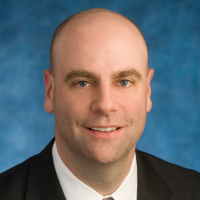Private Prison Company Muscles into Law Enforcement, Creating Occupants for Its Prisons
 Damon Hininger, President and CEO of CCA
Damon Hininger, President and CEO of CCA
On Halloween morning this year, the 1,776 students at Vista Grande High School in Casa Grande, Arizona, were ordered on “lock down,” at the start of the first “drug sweep” in the school’s four-year history. Although school Principal Tim Hamilton admits the school had no drug problem, drug sniffing dogs were brought in, and lockers, backpacks and the students themselves were searched. In the end, only three students were arrested, two of them for possession of less than half a gram of marijuana (0.017 oz., the equivalent one marijuana cigarette or “joint”).
Fittingly for Halloween, some of the “law enforcement” personnel conducting the searches were neither police officers nor Sheriff’s deputies, but employees of a private prison company dressed up in police-like uniforms. In fact, for several years Arizona law enforcement has been using private prison employees in law enforcement operations, which critics say is not only illegal but creates a disturbing conflict of interest, since for-profit prisons make money when more people are arrested, convicted and sentenced to serve time, regardless of whether they are guilty or not.
“To invite for-profit prison guards to conduct law enforcement actions in a high school is perhaps the most direct expression of the ‘schools-to-prison pipeline’ I’ve ever seen,” opined Caroline Isaacs, program director at the Tucson office of the American Friends Service Committee, a Quaker social justice group that urges criminal justice reform.
The private prison company whose employees helped conduct the search at Vista Grande was Corrections Corporation of America (CCA), the nation’s largest for-profit prison operator, with more than 92,000 prison beds in 20 states and the District of Columbia and annual revenues of $1.7 billion—all derived from tax payer-funded government contracts that pay CCA a per-diem, per-prisoner rate for warehousing prisoners and other detainees.
CCA is big locally in Pinal County, Arizona, where Vista Grande High School is located. CCA owns and operates six prisons in the county, making it the largest non-governmental employer. With two prisons owned by rival prison company GEO Group and two run by the Arizona Department of Corrections (ADC), Pinal County (population: 375,000) is, basically, a prison industry community.
The legal problem is that under the Arizona Administrative Code, any individual who engages in the duties of a “peace officer,” including assisting police in a search, must obtain certification from the Arizona Peace Officer Standards and Training (POST) Board. According to POST Executive Director Lyle Mann, however, employees of private prison contractors are exempt from this requirement, so CCA employees are not POST certified. Since they were not certified, the participation of two CCA canine units at Vista Grande was illegal, and may give the arrested students an argument for the dismissal of their prosecutions.
Regarding those students, under Arizona law even the two students found with a joints’ worth of pot face possible prison time because they were apprehended on school grounds, while the third student, found with 10 ounces, could be charged and sentenced as an adult for possession with intent to distribute, a felony that carries a prison sentence.
In other words, they are exactly the kind of low risk, minimum to medium security prisoners off of which CCA makes much of its profits. This constitutes a clear conflict of interest, according to correctional specialist and prison reform advocate, Carl Toersbijns, who retired in 2010 after more than 25 years’ service, including as a deputy warden of operations at several ADC prisons.
“They’re [CCA] not the criminal justice system. They are benefactors of the criminal justice system,” he says. “They use the criminal justice system as a means of making income—for profit. So, their interest in the criminal justice system is totally opposite of the police officer. The police officer is public safety. The primary interest for CCA and associated entities is profit. So, there most definitely is a conflict of interest.”
-Matt Bewig
To Learn More:
Corrections Corporation of America Used in Drug Sweeps of Public School Students (by Beau Hodai, PR Watch)
Private Prison Company to Demand 90% Occupancy (by Noel Brinkerhoff and David Wallechinsky, AllGov)
- Top Stories
- Unusual News
- Where is the Money Going?
- Controversies
- U.S. and the World
- Appointments and Resignations
- Latest News
- Musk and Trump Fire Members of Congress
- Trump Calls for Violent Street Demonstrations Against Himself
- Trump Changes Name of Republican Party
- The 2024 Election By the Numbers
- Bashar al-Assad—The Fall of a Rabid AntiSemite






Comments